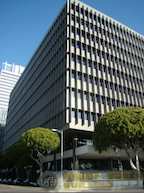
On a slightly hopeful note, though, Veretta Everheart did actually tell me explicitly that they weren’t going to give me advance schedules.2 The reason she gave is that they “are living documents” which are “not retained.”3 Although she doesn’t say so explicitly, this is evidently a nod in the direction of an exemption enumerated in CPRA at Section 6254(a), which states that it’s not required to release
Preliminary drafts, notes, or interagency or intra-agency memoranda that are not retained by the public agency in the ordinary course of business, if the public interest in withholding those records clearly outweighs the public interest in disclosure.
Now, if this is actually what she’s claiming,4 it’s probably not going to fly. First of all, even if these calendars are in fact drafts, there’s a solid argument that the public interest in disclosure outweighs the public interest in withholding. In fact, there’s no discernable public interest in withholding these.5 Not only that, but all of these calendars, drafts and preliminary versions included, are, in fact, retained, making the applicability of this exemption even more implausible.
I know this not only from previous CPRA requests, but also from some material that Veretta Everheart herself sent me yesterday. The request to which this material was putatively responsive was:
As you can see from the attached email, On March 16, 2016, CD13 staffer Aram Taslagyan was aware of a Sanitation clean-up day on March 22, 2016. I would like to see copies of all records that relate to how Aram Taslagyan became aware of this event at least six days in advance. These should include but in no way be limited to emails or other communications from LA Sanitation informing anyone at CD13 of the March 22, 2016 date. I would also like to see all non-email LA Sanitation records pertaining to the March 22, 2016 event that have to do with its scheduling and which existed prior to March 22. These could include HE Conf reports that cover March 22, Encampment Cleanup Authorization System records and/or reports that cover this day, and so on. In particular, I am *not* requesting at this time records that were generated after March 22, like hazard reports, photographs, and so on.
And what they sent is quite revealing. You can see it:
There is no new information here with respect to the cleanups themselves,6 but there is a lot of new information about the truth of Veretta Everheart’s claim that the schedules aren’t retained. In fact, these emails are chock full of schedules from March 2016. If they’re not retained in the ordinary course of business, why do they still have them to send to me seven months later? And not only the schedules, but all the drafts of the schedules, which she also claims aren’t retained?
So the evidence is piling up that these schedules are in fact not exempt from release. Once they’re not exempt from release, they have to release them promptly. Thus it should be possible to get them in advance. However, it’s obvious that they’re not going to give them up without a fight. I don’t see how it’s plausible to fight for these records using the same theory I used with Chad Molnar, but it may still be possible, if more evidence can be gathered, to use an LAMC 49.5.5(A)-based argument founded on a private advantage gained by the people involved in the cleanups. Or it may be necessary to go to court. We’ll see, and you’ll have more news as I get it.
Image of 1149 S. Broadway is a public record and I got it here.
- There’s no way to prove that her removal was related to the (minimal) success of my request short of getting into the weeds of a bunch more CPRA requests that would ultimately just be a distraction from my primary objective, so we’ll probably never know what happened, if anything.
- This is what passes for hopeful when it comes to the City of Los Angeles and CPRA: that they actually answer your requests even if they don’t hand over the records and they don’t give legitimate reasons for not handing them over.
- The full text of her response to this bit is: “We will provide you with the information that is available at the time of your request. I expect this information will generally be provided within 10 days of your request. The information you have been requesting is tentative and subject to change up to and including the day of the event. The calendars we prepare are living documents; as they are updated the prior versions are replaced and are not retained. We are not equipped to provide you with “real time” information.”
- And I’ve asked her to say so explicitly if it is what she’s claiming, albeit with no response to date. That local agencies claim exemptions explicitly is actually required by CPRA, probably due to the widespread occurence of shenanigans like those I’m describing here.
- There are substantial private interests in withholding them, e.g. the people involved might not want to be observed, but there can’t possibly be a public interest in having these cleanups done in secret. Especially because they can’t be done in secret. Passersby can see them happening, so how can it be contrary to the public interest if people who want to see them happening can do so? This theory may at some point form the basis for yet another LAMC 49.5.5(A) complaint against someone.
- These are the famous cat-kicker cleanups, about which you will be hearing at least one more time in the next week or so.
